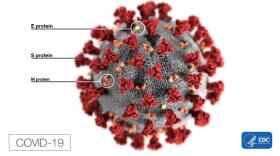The COVID-19 pandemic has been especially difficult for young people in high school and college in Kentucky and across the U.S.
The threat of illness, the necessary quarantines and the roller coaster of in-person to virtual learning and back again have added up to unprecedented anxiety for many young people.
Western Kentucky University senior Hannah Covington is part of the WKU Public Broadcasting Brinkley Student Employment Program. She talked with social worker Rachel Wyatt, director of the iHOPE program at Lifeskills in Bowling Green. Wyatt says the combination of stressors has increased the number of young people seeking mental health counseling,
Wyatt: iHope is an early intervention treatment and support program that offers services for individuals between the ages of 12 and 30 who are having what we call extraordinary experiences. We call this clinical high-risk symptoms of psychosis.

Covington: What would you describe these episodes as?
Wyatt: Symptoms can look like increased anxiety. Changes in mood, so having an irritable mood, but that has been sort of brought on suddenly. When a person isn't able to do the things that they're used to doing, especially things that they love doing. When they have a drop in grades. And even changes in light perception. So, things might seem brighter or duller or sounds might seem louder or softer.
Covington: And has there been an increase in patient numbers?
Wyatt: Yes. So, across the spectrum of Lifeskills, looking specifically at what we call transition-age youth and young adults, so that's between the ages of 16 and 25, we've seen an increase from last fiscal year to this fiscal year in terms of clients that we have admitted into any program. In fiscal year 2020, Lifeskills, admitted 270 of those transition-age youth. And for fiscal year 2021, we admitted 397.
Covington: Could that big jump be due to COVID?
Wyatt: I think COVID has had a lot to do with that. The isolation especially, you know, from friends and even family members, which has really increased anxiety and depression in a lot of the clients that we're seeing at Lifeskills.
Covington: With the increased anxiety and depression, what number of ages in the transitional age are you seeing the most saying, Hey, I have anxiety or depression?
Wyatt: For our program, I'm seeing that mainly between the ages of 12 and 21 or 22.
Covington: And what are some of the things these clients are saying who are coming up and saying why they have anxiety or depression?
Wyatt: For the last year that I've been treating a majority of my clients, it's being at home with mom and dad all of the time. And so the problems in and of itself, you know, that creates, just because they're teenagers and parents, not being able to spend time with their friends. So that lack of social connection. You know, I know we are a world of technology, but texting and Snapchat, that only goes so far.
Covington: Has it been good that you're seeing people coming forward saying, I need help?
Wyatt: Yes, I don't think that anybody wants to have to have help for their mental health issues. But I think we are seeing through the pandemic that people have recognized that there are mental health issues and they have enough insight, for the most part, to seek those services. And one of the things that I am seeing from young people is that they are very eager to reduce that stigma and talking about mental health.
Covington: It was nice talking to you, Rachel.
Wyatt: Well, it was nice talking to you, Hannah. Thank you so much.
Covington: Thank you.



